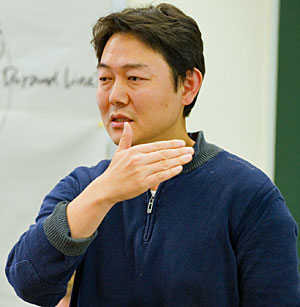SIT Professor promotes Syrian-Turkish coexistence
May 22nd, 2017 | SIT Graduate Institute

SIT Professor Tatsushi Arai led a peacebuilding workshop for 35 psychosocial and humanitarian support professionals from Syria and Turkey who gathered at the Social Sciences University of Ankara (SSUA) May 12-14. The workshop was co-sponsored by SSUA and the International Organization for Migration (IOM), a United Nations-affiliated agency.
Professor Arai’s training took place against the backdrop of the sustained political and humanitarian crisis in Syria, which has generated an influx of more than 3 million Syrian refugees into Turkey during the past six years. While coping with the far-reaching effects of the war in Syria, Turkey faced a coup attempt in July 2016. In April 2017, Turkey held a referendum for constitutional reform which led to a significant expansion of the president’s power.
While Turkish society is undergoing these and other historic changes, Syrian refugees in Turkey are left with uncertainties surrounding their legal status. The refugees also suffer from their inability to sustain their livelihoods, security, access to education, and quality of life. The Turkish host communities in turn find it difficult to communicate with their Arabic-speaking guests. They struggle to manage the deepening cultural divides that challenge their identities and ways of life.
What’s more, Turkish host communities are concerned about public services, resources, and job opportunities taken by the Syrian refugees who are willing to accept significantly lower wages than their Turkish counterparts. Consequently, many people Turkey fear the prospect of Syrian refugees staying much longer, perhaps even indefinitely.
In view of these challenges, Professor Arai’s workshop focused on the interconnected nature of deep social structure and deep culture underlying Turkish-Syrian conflicts in Turkey. In his workshop, a multinational cohort of Turkish and Syrian professionals gained hands-on skills in analyzing and addressing migration-related conflicts.
Case studies, simulations, and theatrical performances throughout the workshop examined current issues such as education, health, commerce, domestic and gender-based violence, and civil society-government relations. The workshop contributed to a broader scope of IOM-sponsored capacity-building activities in Turkey, Syria, Lebanon, and beyond.
As a scholar-practitioner, Professor Arai has been engaged in initiatives aimed at supporting Syrian capacity-building since 2014. He plans to incorporate lessons from these activities into graduate courses with SIT’s Peacebuilding and Conflict Transformation program, as well as other opportunities for public awareness and skills-building. Professor Arai will also develop concepts and methods of applied practice to tackle a range of conflicts in Syria and the broader Middle East.
